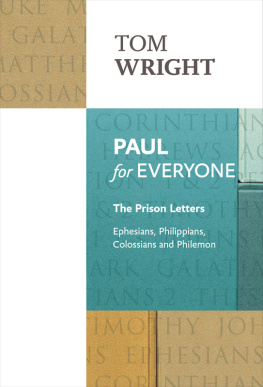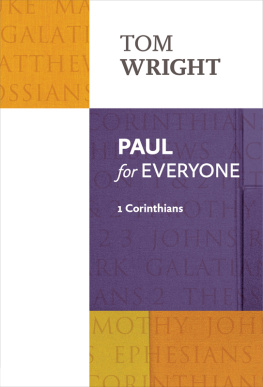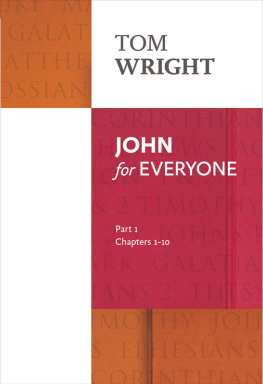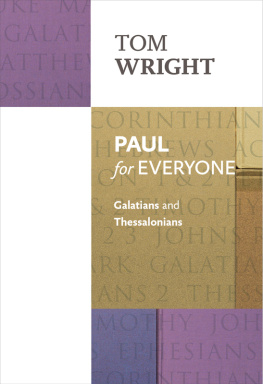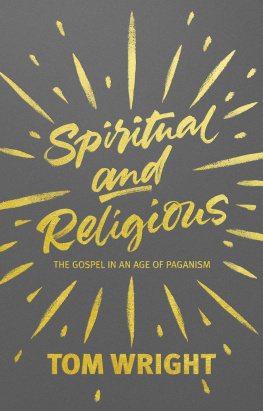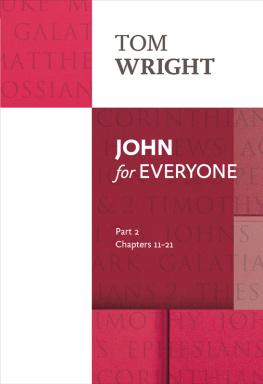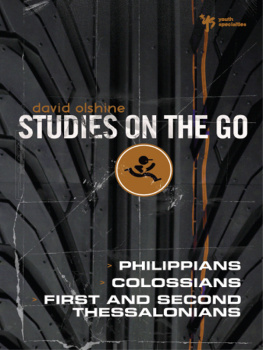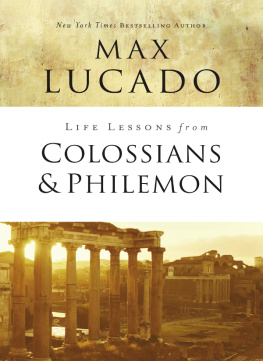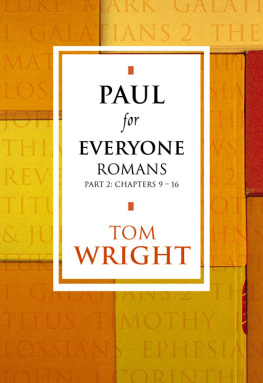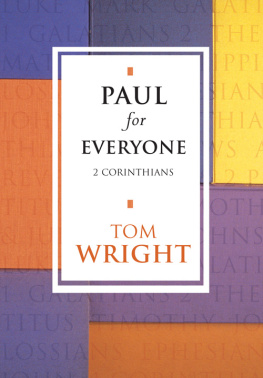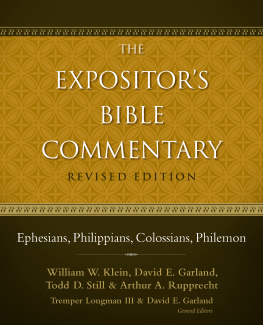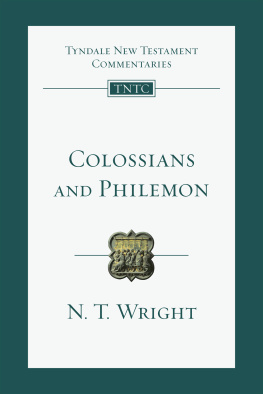The New Testament for Everyone commentary series
Matthew for Everyone, Part 1: Chapters 115
Matthew for Everyone, Part 2: Chapters 1628
Mark for Everyone
Luke for Everyone
John for Everyone, Part 1: Chapters 110
John for Everyone, Part 2: Chapters 1121
Acts for Everyone, Part 1: Chapters 112
Acts for Everyone, Part 2: Chapters 1328
Paul for Everyone: Romans, Part 1 Chapters 18
Paul for Everyone: Romans, Part 2 Chapters 916
Paul for Everyone: 1 Corinthians
Paul for Everyone: 2 Corinthians
Paul for Everyone: Galatians and Thessalonians
Paul for Everyone: The Prison Letters Ephesians, Philippians, Colossians and Philemon
Paul for Everyone: The Pastoral Letters 1 and 2 Timothy and Titus
Hebrews for Everyone
Early Christian Letters for Everyone: James, Peter, John and Judah
Revelation for Everyone
First published in Great Britain in 2002
Society for Promoting Christian Knowledge
36 Causton Street
London SW1P 4ST
www.spckpublishing.co.uk
Reprinted six times
Reissued 2014
Copyright Nicholas Thomas Wright 2002
All rights reserved. No part of this book may be reproduced or transmitted in any form or by any means, electronic or mechanical, including photocopying, recording, or by any information storage and retrieval system, without permission in writing from the publisher.
SPCK does not necessarily endorse the individual views contained in its publications.
British Library Cataloguing-in-Publication Data
A catalogue record for this book is available from the British Library
ISBN 9780281072002
eBook ISBN 9780281072835
Typeset by Pioneer Associates, Perthshire
eBook by Graphicraft Limited, Hong Kong
CONTENTS
For
Julian and Miranda
remembering the great mystery
of Christ and the Church
(Ephesians 5.3132)
On the very first occasion when someone stood up in public to tell people about Jesus, he made it very clear: this message is for everyone .
It was a great day sometimes called the birthday of the church. The great wind of Gods spirit had swept through Jesus followers and filled them with a new joy and a sense of Gods presence and power. Their leader, Peter, who only a few weeks before had been crying like a baby because hed lied and cursed and denied even knowing Jesus, found himself on his feet ex-plaining to a huge crowd that something had happened which had changed the world for ever. What God had done for him, Peter, he was beginning to do for the whole world: new life, forgiveness, new hope and power were opening up like spring flowers after a long winter. A new age had begun in which the living God was going to do new things in the world beginning then and there with the individuals who were listening to him. This promise is for you , he said, and for your children, and for everyone who is far away (Acts 2.39). It wasnt just for the person standing next to you. It was for everyone.
Within a remarkably short time this came true to such an extent that the young movement spread throughout much of the known world. And one way in which the everyone promise worked out was through the writings of the early Christian leaders. These short works mostly letters and stories about Jesus were widely circulated and eagerly read. They were never intended for either a religious or intellectual elite. From the very beginning they were meant for everyone.
That is as true today as it was then. Of course, it matters that some people give time and care to the historical evidence, the meaning of the original words (the early Christians wrote in Greek), and the exact and particular force of what different writers were saying about God, Jesus, the world and themselves. This series is based quite closely on that sort of work. But the point of it all is that the message can get out to everyone, especially to people who wouldnt normally read a book with footnotes and Greek words in it. Thats the sort of person for whom these books are written. And thats why theres a glossary, in the back, of the key words that you cant really get along without, with a simple description of what they mean. Whenever you see a word in bold type in the text, you can go to the back and remind yourself whats going on.
There are of course many translations of the New Testament available today. The one I offer here is designed for the same kind of reader: one who mightnt necessarily understand the more formal, sometimes even ponderous, tones of some of the standard ones. I have tried naturally, to keep as close to the original as I can. But my main aim has been to be sure that the words can speak not just to some people, but to everyone.
This book includes the four short letters Paul wrote from prison: Ephesians, Philippians, Colossians and Philemon. His own personal circumstances make these especially poignant, and give us a portrait of a man facing huge difficulties and hardships and coming through with his faith and hope unscathed. But what he has to say to the young churches and, in the case of Philemon, to one man facing a hugely difficult moral dilemma is even more impressive. Already, within thirty years of Jesus death and resurrection, Paul has worked out a wonderful, many-coloured picture of what Jesus achieved, of Gods worldwide plan, and of how it all works out in the lives of ordinary people. So here they are: Paul for Everyone the Prison Letters!
Tom Wright
1From Paul, one of King Jesus apostles through Gods purpose, to the holy ones in Ephesus who are also loyal believers in King Jesus: 2may God our father and the Lord Jesus, the king, give you grace and peace!
3Let us bless God, the father of our Lord Jesus, the king! He has blessed us in the king with every spirit-inspired blessing in the heavenly realm.
The most successful tourist attraction to appear in London in recent years is the London Eye. From a distance it looks like a giant Ferris wheel, but this is no fun-fair ride. For a start, its far, far bigger: it rises to 450 feet above the River Thames. Its 32 capsules can each hold 20 people, and it takes them half an hour to rotate the full circle. Plenty of time to have a wonderful view of all central London, with its historic buildings and palaces, its cathedrals and abbeys, its parks and gardens, with Big Ben and the Houses of Parliament in the foreground. The London Eye is, in fact, not only a wonderful sight in itself, visible from many points in the capital. It is the place from which you can get the best possible view of London. To do any better, youd have to go up in an aeroplane, and indeed it is operated and run by one of the airline companies.
The letter to the Ephesians stands in relation to the rest of Pauls letters rather like the London Eye. It isnt the longest or fullest of his writings, but it offers a breathtaking view of the entire landscape. From here, as the wheel turns, you get a birds-eye view of one theme after another within early Christian reflection: God, the world, Jesus, the church, the means of salvation, Christian behaviour, marriage and the family, and spiritual warfare. Like someone used to strolling around London and now suddenly able to see familiar places from unfamiliar angles and to see more easily how they relate to each other within the city as a whole the reader who comes to Ephesians after reading the rest of Paul will get a new angle on the way in which his thinking holds together.
Two questions need to be looked at as we begin. First, was the letter really by Paul himself? Many careful scholars have doubted it. Its clear that some of it is written in quite a formal way, without the rapid-fire, almost street-level debating style Paul uses in some of the other letters. On the other hand, some scholars have established their image of Paul on the basis of a particular way of understanding Romans and Galatians, and have then felt that Ephesians cant be by the same person, because it doesnt support that point of view. Some have taken a compromise position, and said that though Paul may not actually have written it himself, it may have been written by an assistant under his direction. My own view, which I will follow in going through the letter here, is that, once we understand Pauls thought in the way I think we should, there is no difficulty about holding together what he says here with what he says in the other letters. The writing style is indeed a little different, but Paul wouldnt be the first or the last writer to use different styles when different occasions demand it.
Next page
